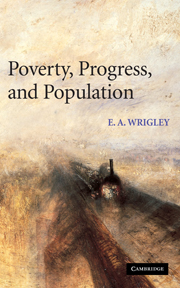Book contents
- Frontmatter
- Contents
- List of figures
- List of tables
- Acknowledgements
- Introduction
- PART I The wellsprings of growth
- PART II Town and country
- PART III The numbers game
- 12 Explaining the rise in marital fertility in England in the ‘long’ eighteenth century
- 13 No death without birth: the implications of English mortality in the early modern period
- 14 The effect of migration on the estimation of marriage age in family reconstitution studies
- 15 Demographic retrospective
- Bibliography
- Index
15 - Demographic retrospective
Published online by Cambridge University Press: 23 December 2009
- Frontmatter
- Contents
- List of figures
- List of tables
- Acknowledgements
- Introduction
- PART I The wellsprings of growth
- PART II Town and country
- PART III The numbers game
- 12 Explaining the rise in marital fertility in England in the ‘long’ eighteenth century
- 13 No death without birth: the implications of English mortality in the early modern period
- 14 The effect of migration on the estimation of marriage age in family reconstitution studies
- 15 Demographic retrospective
- Bibliography
- Index
Summary
It is now two decades since the publication of The population history of England and more than three decades since the Cambridge Group for the History of Population and Social Structure began the process of garnering the data on which a better description and understanding of the population history of England could be based. The exercise as whole gave rise to two large books and many articles. The original intention in collecting aggregative data from a large number of parishes was to identify those best suited to becoming the subject of a family reconstitution exercise, but in the event, as the volume of aggregative returns grew beyond expectation, thanks to the willing cooperation of many scores of local historians throughout the country, the value of making direct use of these data became more and more evident. An early form of inverse projection was developed to exploit the new opportunities and the results were published in 1981 in The population history of England. More than a decade passed before there was a comparable reconstitution volume embodying data drawn from the 26 parishes which had been chosen as promising particularly well for this purpose. The second volume, English population history, was published in 1997. The two volumes jointly comprised a far fuller account of the demographic history of England than had previously been available. They were based on two very different methods of using parish register material. Generalised inverse projection (GIP) depends on the counting of births and deaths and converting the resulting aggregative totals into estimates of fertility and mortality, whereas family reconstitution is based on nominal linkage, the articulation of information about individuals to reconstruct the demographic histories of families.
- Type
- Chapter
- Information
- Poverty, Progress, and Population , pp. 394 - 440Publisher: Cambridge University PressPrint publication year: 2004
- 1
- Cited by



